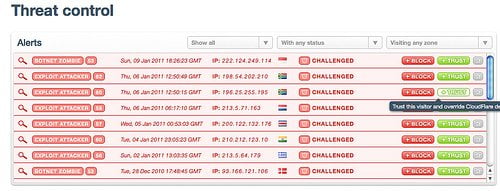
Application HostingCloudFlarecPanel/WHMDrupal HostingFeaturedHosting ServiceMagento HostingphpPBB HostingUnix/LinuxWeb HostingWeb SecurityWordpress hosting
CloudFlare Railgun™ Optimized Partner!
We are really excited to be able to offer the CloudFlare Railgun ™ technology to all our customers completely free of charge with all of our Web Hosting packages! Railgun is CloudFlare’s latest performance optimization technology that gives you significant...
Application HostingCloudFlarecPanel/WHMDrupal HostingHosting ServiceMagento HostingphpPBB HostingSecurityTipsUnix/LinuxWeb HostingWeb SecurityWordpress hosting
CloudFlare Threat Control: Making your website safer
One of the benefits of CloudFlare is that it provides broad, effective security for any website. CloudFlare is a first line of defense against all sorts of threats from comment spammers to automated crawlers that don’t follow robots.txt. When you sign up for XeonBD’s hosting account...
Understanding Linux CPU Load
We all might be familiar with Linux load averages already. Load averages are the three numbers shown with the uptime and top commands – they look like this: load average: 0.09, 0.05, 0.01 Most people have an inkling of what the load averages mean:...
Connect Remotely Ubuntu via Windows Remote Desktop
Connecting remotely to your Ubuntu desktop from a Windows RDP Client can enhance productivity and accessibility. This guide walks you through the process of setting up xRDP on Ubuntu and configuring Windows for seamless remote access. First of all, try...
How to mount an additional Hard Drive to CentOS cPanel
Need to mount an additional hard drive or disk partition on Linux? Here’s what you need to know about the disks and mount commands. What Is Mounting? In most cases, mounting refers to the process which enables your computer to...
Investigating and Troubleshooting CVE-2015-0235 (glibc) Ghost Vulnerability
A potential exploit has been discovered that may allow attackers to execute malicious code across many Linux distributions. The vulnerability in the GNU C Library (glibc) has been assigned CVE-2015-0235 and is being referred to by some as the “Ghost”...
Information on CVE-2015-0235 (GHOST) Vulnerability for Red Hat and CentOS
A vulnerability found in the glibc library, specifically a flaw affecting the gethostbyname() and gethostbyname2() function calls, that allows a remote attacker to potentially execute arbitrary code. CentOS 5, CentOS 6, and CentOS 7 are potentially affected, thus we want...
How to Check the glibc (GNU libc) Version on CentOS 6 and CentOS 7
Pre-Flight Check These instructions are intended specifically for checking the installed version of glibc. I’ll be working from a Liquid Web Core Managed CentOS 6 and CentOS 7 server, and I’ll be logged in as root. Using ldd ldd --version...
How To Update the glibc (GNU libc) in CentOS / Red Hat
Updating glibc on Red Hat Linux or CentOS Linux is a very simple process. Most commonly you will use the following command in the case of a security vulnerability, or perhaps just to verify that you’re running the most up-to-date...
What is CloudLinux?
Reaching a high level of stability can be difficult, sometimes unachievable, for many shared hosting companies. Sudden resource usage spikes, increases in traffic, and hacker attacks are some of the problems system administrators cope with every day. For years, this...




